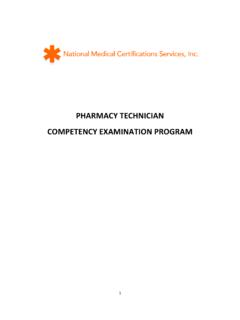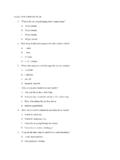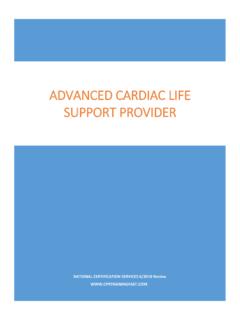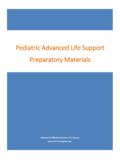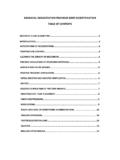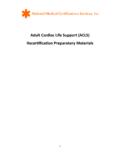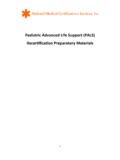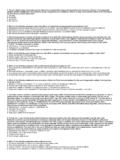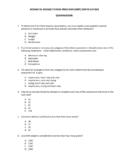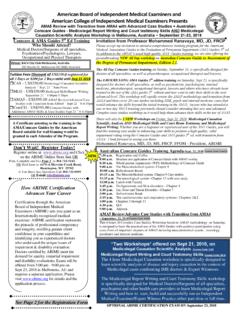Transcription of MEDICAL ASSISTANT COMPETENCY …
1 MEDICAL ASSISTANT . COMPETENCY EXAMINATION PROGRAM. 1. MEDICAL ASSISTANT (MA) RECERTIFICATION. TABLE OF CONTENTS. MEDICAL OFFICE MANAGEMENT .. LAW AND ETHICS . 3-5. COMMUNICATION, EQUIPMENT, AND SUPPLIES .. 6-7. FINANCIAL MANAGEMENT .7-10. MEDICAL TERMINOLOGY . 10-12. PHARMACOLOGY .. 12-13. ANATOMY AND PHYSIOLOGY ..14-20. MEDICAL PROCEDURES .. INFECTION CONTROL, EXPOSURE CONTROL AND SAFETY .. 20-23. PATIENT EXAMINATION AND CLINICAL SKILLS 23-25. PHLEBOTOMY AND DIAGNOSTICS .. 25-27. DIAGNOSTIC TEST, LAB PROCEDURES AND ELECTROCARDIOGRAPHY ..27-30. 2. MEDICAL Office Management Law and Ethics 1. Right and wrong conduct is known as ethics. 2. The most common type of MEDICAL tort liability is negligence. 3. A person being sued is called the defendant. 4. The withdrawal of a physician from the care of a patient without reasonable notice of such discharge from the case by the patient is abandonment. 5. An unlawful threat or attempt to do bodily injury to another is assault.
2 6. The health worker is protected by law if it can be determined that he or she acted reasonable as compared with fellow workers. This is called reasonable care. 7. Negligence by a professional person is called malpractice. 8. An act that violates criminal law is called a crime. 9. The breaking of a law, promise, or duty is called a breach. 10. The ability to see things from another person's point of view is empathy. 11. The time established for filing law suits is the statute of limitations. 12. A write that commands a witness to appear at a trial or other proceeding and to give testimony is a subpoena. 13. A wrong committed against another person or the person's property is a tort. 14. Holding or detaining a person against his will is false imprisonment. 15. A violation of a person's right not to have his or her name, photograph or private affairs exposed of made public without giving consent is an invasion of privacy. 16. A major crime for which greater punishment is imposed other than a misdemeanor is a felony.
3 17. One who institutes a lawsuit is a plaintiff. 18. A legal statement of how an individual's property is to be distributed after death is a will. 19. Information given by a patient to MEDICAL personnel which cannot be disclosed without consent of the person who gave it is privileged communication. 20. A rule of conduct made by a government body is a law. 21. Failure to do something that reasonable person would do under ordinary circumstances that ends up causing harm to another person or a person's property is negligence. 22. Permission granted by a person voluntarily and in his right mind is consent. 23. Injuring the name and reputation of another person by making false statements to a third person is defamation. 3. 24. An agreement between two or more parties for the doing or not doing of some definite thing is a contract. 25. Lack of physical or mental fitness is known as incompetence. 26. The final decision of a court in an action or suit is a judgment.
4 27. Responsibility of an employer for the acts of an employee is respondent superior. 28. A Latin term signifying that a person is not of sound mind is non compos mentis. 29. A person who is no longer under the care, custody, or supervision of a parent is called an emancipated minor. 30. An impartial panel established to listen and to investigate patient's complaints about MEDICAL care or excessive fees is called a MEDICAL grievance committee. 31. Latin for things done; deeds ; the facts and circumstances attendant to the act in question would be called res gestae. 32. Testimony of a witness under oath and written down before trial for possible use when the case comes to trial is deposition. 33. A statute that enforces private rights and liabilities, as differentiated from criminal law is called a civil law. 34. Violation or omission of a legal or moral duty is called breach of duty. 35. A deliberate physical attack upon a person is called battery. 36. Latin for he who acts through another acts for himself is called qui facit per alium facit per se.
5 37. The branch of study of moral issues, questions and problems arising in the practice of medicine and biomedical research is called bioethics. 38. A statement given concerning some scientific, technical or professional matter by an expert, such as a physician is called expert testimony. 39. A patient's failure to act prudently and reasonably or doing that which a reasonable person would not do under similar circumstances is called contributory negligence. 40. Consent to treatment based on a full understanding of all possible risks of unpreventable results of that treatment is called assumption of risk. 41. Conduct, courtesy and manners that are customarily used in a MEDICAL office by MEDICAL professionals are known as MEDICAL etiquette. 42. An intentional perversion of truth for the purpose of inducing another in reliance upon it to part with some valuable thing belonging to him or to surrender a legal right is called fraud. 4. 43. To interrupt or discontinue a suit temporarily with the intention or resumption at a later date, or to ask for a continuance is called a suspension.
6 44. Latin for things decided that is a matter already decided by a judicial authority is called res judicata. 45. That which in natural and continuous sequence, unbroken by any new independent cause, produces an event, and without which the injury would not have occurred is called proximate cause. 46. The presumption or inference of negligence when an accident is otherwise unable to be explained in terms of ordinary and known experience is called res ipsa loquitor. 47. Failure to achieve an agreed upon result, even when the highest degree of skill has been used, is called breach of contract. 48. A physician must have a narcotic license to dispense, prescribe or administer controlled substances. 49. Unauthorized disclosure of information regarding any patient to a third party may result in invasion of privacy. 50. MEDICAL research is often published in MEDICAL journals that are evaluated by members of the MEDICAL community through a process known as peer review.
7 51. Under the Peer Review Improvement Act of 1982, Peer Review Organizations are responsible for the review of the appropriateness and necessity of putting a patient into the hospital by a process known as admissions review. 52. A fraudulent signature is called forgery. 53. Ethics are defined as what are right and wrong. 54. The use of fetal tissue transplantation for research might involve a decision based upon bioethics. 55. A physician must have the patient's permission in writing to reveal any confidential information except in the instance of gunshot wound(s). 56. It is unethical to deny treatment to HIV infected patients. 57. HIPAA is a federal regulation that requires health care professionals to protect the privacy and confidentiality of patients' health information. 58. In the health care field the acronym HIPAA stands for Health Insurance Portability and Accountability Act. 59. The statement A physician shall respect the law is a part of the AMA Code of Ethics.
8 60. Breach of confidentiality generally results from an act of carelessness, without an intent to harm. 5. Communication, Equipment and Supplies 1. A system whereby large quantities of data can be accessed, searched, sorted and arranged rapidly by computer is called a database management system. 2. A computer monitor, hard drive and printer are known as hardware. 3. The term for the technology that tells a computer what to do is known as the software. 4. The computer key DEL means delete. 5. The computer's directional arrow keys move the cursor, right, left, up, or down. 6. Referring to computers, the term user friendly refers to how easy the system is to operate. 7. The process of changing words into numbers so that computers can be used in processing insurance claims is called coding. 8. A business letter written in full block style will have all lines at the left hand margin. 9. Making a duplicate file to protect computer information from being lost is called making a backup.
9 10. When writing a business letter, the salutation of a letter should be followed by a colon. 11. A newsletter that weighs less than one pound would be considered third class mail. 12. A fax machine is designed to receive and send printed documents via the telephone. 13. Business or handwritten mail that weighs less than 11 ounces is known as first class mail. 14. Parcel post or fourth class mail is used for bound printed matter, film, and sound recordings. 15. Before placing a telephone caller on hold, it is appropriate to: a. ask if you may put the caller on hold b. wait for the caller to confirm they can wait c. obtain a return phone number. 16. An incoming call should be answered by the third ring. 17. When taking a routine phone message obtain: a. caller's name b. caller's return phone number c. current day's date 6. 18. Prior to answering an incoming call , the MEDICAL ASSISTANT should smile. 19. When handling incoming mail, the MEDICAL ASSISTANT should attach the envelope to the correspondence.
10 20. A letter should be folded in thirds face-up using a #10 envelope. 21. Grammar is the study of words and their relationship to other words in a sentence. 22. When handling a patient complaint, take all complaints seriously and take thorough notes. 23. When working with patients from a culture different from your own, show respect for their culture. 24. Body language, body posture, space and distance are all examples of non-verbal communication. 25. When caring for patients with physical disabilities: a. do not rush them b. ask if they need assistance before giving assistance c. provide ample room for patients with assistive devices Financial Management 1. A bed patient in a hospital is called inpatient. 2. A person who represents either party of an insurance claim is the adjuster. 3. A request for payment under an insurance contractor bond is called a claim. 4. Payment made periodically to keep an insurance policy in force is called premium. 5. A person or institution that gives MEDICAL care is a provider.
